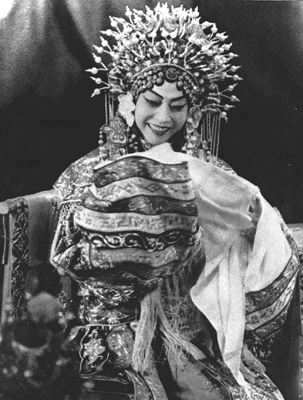| Tools: Save | Print | E-mail | Most Read |
| Revealing the True Face of a Legend |
| Adjust font size: |
Few know that Mei smoked, and even fewer could ever compare him to a puff of smoke. However, Lan Bing and Ye Jing, the two female directors of the documentary film A Great Master Recaptured (Youjian Mei Lanfang) have their reasons. "Mei Lanfang in many people's eyes is mysterious," Lan Bing said. "He is the most attractive woman on the stage, but a handsome man, a husband and father in real life." Then who is the real Mei Lanfang? The film tries to answer the question by using a montage of pictures, music and old footage of the great master in action. It reveals his life as a great artist, a loving father and a great teacher. Chronologically, the film recalls the big events in Mei's life from his debut in Beijing at 10 to his performance for the new China's scientists in 1961, two months before he passed away. There is a three-minute clip of Mei at 36 performing one Peking Opera episode Fei Zhen'e Killing the Tiger (Fei Zhen'e Cihu) in the United States. Paramount recorded the performance, and it is the clearest image of Mei's performance during his early days. Lan bought the copyright to use the footage from a US university library for 60,000 yuan (US$7,604). This rare footage as well as scenes, such as Mei and his international friends chatting in his own house and his performance for the soldiers and factory workers in the 1950s has seldom been shown to the public before. Konstantin Stanislavsky, Russian theatre and acting innovator, once said after he watched Mei's performance in the former Soviet Union in 1935: "After seeing Mei's finger movement, one hundred of my students should chop off their hands." The film reveals how Mei shaped his various female characters, from the witty maid to the drunken beauty, by every single finger movement, every blink of an eye and every word he uttered. What adds to the glamour of "an artist Mei Lanfang" is not only Mei's own performance, but also those of his son and disciples. A cast of family and disciples Because most of the footage of Mei's stage art has been lost in the chaos of the 1930s and '40s, directors invited Mei Baojiu, Mei Lanfang's youngest son, to present Mei's signature episodes with a dubbing of the master's own vocals. Mei Baojiu is also a prominent Peking Opera actor famous for his exquisite performance of female characters. They extended the same invitation to three apprentices of the Mei School of Peking Opera. Mei Baojiu also shares the memories of his beloved father in the film. "When I see the film, I immediately replay my father's image, his smile, and his voice in my mind. The film features truthfulness, without showing off techniques or fancy visual effects. Just tells the life story of my father in a very realistic way," Mei Baojiu said. Zhang Jing, the apprentice of Mei Baojiu and professor of the National Academy of China Local Operas, stages some episodes Mei Lanfang with the master's own vocals. "To me, Mei Lanfang is a master who devoted himself to his beloved art. I hope by my performance and that of other disciples of the Mei School, people will know the art is being handed down, which is seldom mentioned in previous films about Mei," Zhang said. Unknown stories It was widely known that Mei wore a beard for eight years during the 1930s so he could not perform his famous female characters for the occupying Japanese troops. This part of Mei's story is narrated in a plain tone and is not exaggerated or emphasized. It differs from previous books or films, which push his patriotism. "Mei Lanfang was not a hero; he was merely an artist. His patriotism was a very natural gesture at that time. Any playing up about it is a violation of Mei's life attitude," said Wu Ying, vice-president of Mei Lanfang Art Studies Association and a childhood friend of Mei Baojiu. Lan agrees. "After so many years, we should meditate what is really important about Mei. He is at first a great artist. I don't want the audience to remember only the patriot Mei Lanfang instead of the artist Mei Lanfang. Mei made three journeys to Japan, in 1919, 1924 and 1956, and also travelled to the United States and the Soviet Union. Lan and Ye believe that Mei's popularity in the Western countries during the height of his creative powers illustrates his international influence. It has not been decided yet when the film will be massively released in China, but according to Gao Feng, producer of the film, it will definitely be distributed both at home and abroad. And the crew strongly believe in the market. "Although some think Peking Opera is not that glorious nowadays, I always feel proud to be a Mei School exponent, and I know still there are a large number of people who love the art," said Zhang Jing. "Many young people today know Mei Lanfang as a name, but at the same time, they don't know the person. I hope my own students will watch the film, to know about Mei's artistic achievements, his commitment to career and his noble personality." (China Daily November 4, 2006) |
| Tools: Save | Print | E-mail | Most Read |
 |
| Related Stories |
|
|
Product Directory China Search |
Country Search Hot Buys |
